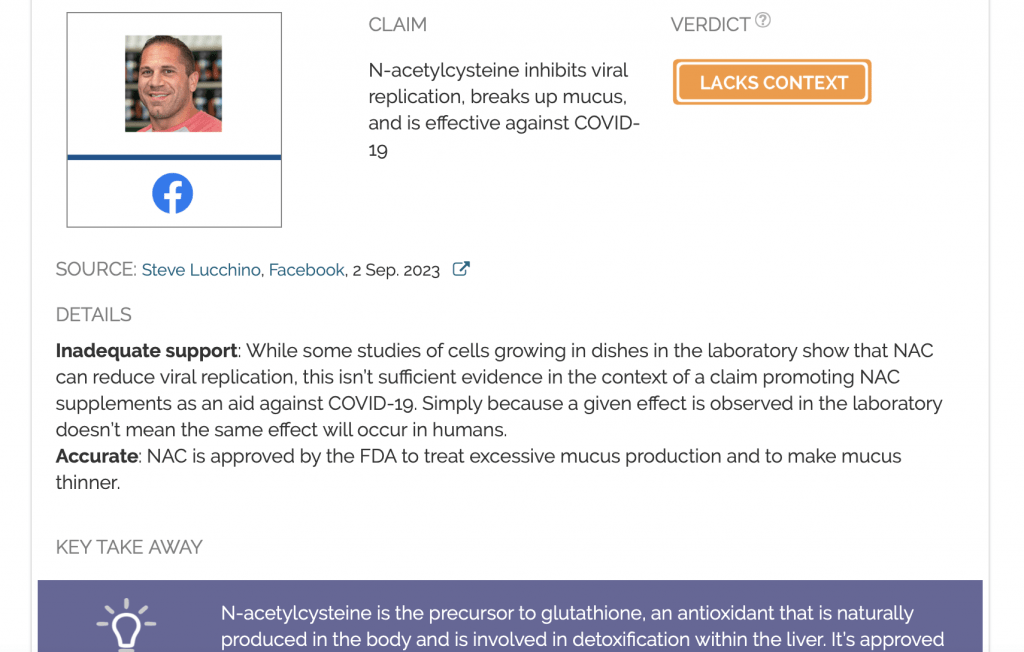Lack of clinical evidence for claim that N-acetylcysteine is effective against COVID-19 and stops viral replication
newsletter via Feeds on Inoreader 2023-09-25
Summary:

REVIEW
A Facebook reel posted on 2 September 2023 made several claims about the benefits of taking amino acid supplement N-acetylcysteine (NAC). In the reel, Steve Lucchino, athlete and owner of health supplement shop Elite Nutrition Omaha, claimed that NAC “stops viral replication”, “breaks up mucus”, and is “great for your lungs”. In the background of the video, studies related to COVID-19 were shown. The reel was viewed more than 96,000 times.Claims that NAC is effective for treating COVID-19 also appeared on TikTok, with some videos drawing tens of thousands of views.
The reel contains a mix of accurate claims and claims that lack context and could be potentially misleading, as we will explain below.
What is NAC?
NAC is the precursor to glutathione, an antioxidant that is naturally produced in the body and is involved in detoxification within the liver. It is also involved in scavenging free radicals, which can otherwise damage cellular components, including DNA. NAC is also known as N-acetyl-L-cysteine.
As a prescription drug, NAC is approved by the U.S. Food and Drug Administration (FDA) to treat acetaminophen (Tylenol) overdose and excessive mucus production.
But NAC can also be found in the form of dietary supplements. NAC is preferred over glutathione as a dietary supplement because oral glutathione isn’t as well-absorbed by the body as NAC.
NAC supplements have been touted as a panacea for many conditions, ranging from aging-related issues to attention-deficit hyperactivity disorder, judging by TikTok videos promoting NAC supplements. However, the clinical evidence to substantiate these claims is still limited[1,2]. For example, important questions, like determining the effective dose for a particular condition and whether the effective dose would be the same across all conditions, have also not been resolved yet.
These glowing endorsements of NAC supplements also tend to leave out important information about the potential drawbacks of NAC. For example, consuming too much NAC can lead to gastrointestinal problems like diarrhea, vomiting, and flatulence.
In a 2019 article for Science Magazine, chemist Derek Lowe highlighted the fact that antioxidants like NAC don’t always only have a beneficial effect on the body. He pointed to a study published in 2014 showing that antioxidants, including NAC, sped up lung cancer progression in mice[3]. Another study published in 2019 showed that chronic NAC treatment promoted lung cancer in aging mice[4]. Overall, these findings suggest some caution should be exercised in taking NAC supplements.
In an article for UCLA Health, Robert Ashley, a specialist in internal medicine and assistant professor, explained that while there’s some evidence of benefit from glutathione supplementation in people with certain medical conditions, healthy people are unlikely to be deficient in glutathione and that “there is no good study for the use of glutathione in healthy people”.
Evidence for NAC’s effect on viral replication came from in vitro studies, not people
To support his claim that NAC stops viral replication and is effective against COVID-19, Lucchino cited